第一堂课笔记
初二上册生物第一课笔记

初二上册生物第一课笔记
以下是初二上册生物第一课《动物的主要类群》的笔记:
一、动物是生物圈中的主要成员,已知的动物大约有150多万种,动物可
分为脊椎动物和无脊椎动物两大类。
二、脊椎动物的特征:体内有由脊椎骨组成的脊柱,包括鱼类、两栖类、爬行类、鸟类和哺乳类。
无脊椎动物的特征:体内没有由脊椎骨组成的脊柱,包括腔肠动物、软体动物、节肢动物等。
三、通过对不同动物的观察,我们可以了解到生物的多样性和适应性。
不同种类的动物有着不同的形态、结构和生活习性,这反映了生物进化的历程。
了解动物的主要类群可以帮助我们更好地认识和保护生物圈中的生物多样性。
四、保护动物多样性,需要采取措施防止环境污染、保护生态平衡等措施,同时还需要加强宣传教育,提高人们的环保意识。
五、本节课重点:掌握脊椎动物和无脊椎动物的分类,理解动物多样性的意义。
难点:理解不同动物的形态、结构和生活习性与其生存环境的关系。
六、课后作业:完成课堂练习,复习本节课所学内容。
五年级上册课堂笔记第一课
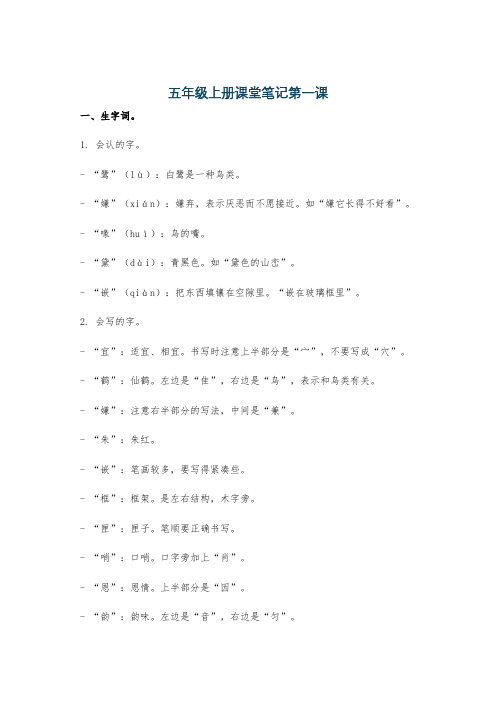
五年级上册课堂笔记第一课一、生字词。
1. 会认的字。
- “鹭”(lù):白鹭是一种鸟类。
- “嫌”(xián):嫌弃,表示厌恶而不愿接近。
如“嫌它长得不好看”。
- “喙”(huì):鸟的嘴。
- “黛”(dài):青黑色。
如“黛色的山峦”。
- “嵌”(qiàn):把东西填镶在空隙里。
“嵌在玻璃框里”。
2. 会写的字。
- “宜”:适宜、相宜。
书写时注意上半部分是“宀”,不要写成“穴”。
- “鹤”:仙鹤。
左边是“隹”,右边是“鸟”,表示和鸟类有关。
- “嫌”:注意右半部分的写法,中间是“兼”。
- “朱”:朱红。
- “嵌”:笔画较多,要写得紧凑些。
- “框”:框架。
是左右结构,木字旁。
- “匣”:匣子。
笔顺要正确书写。
- “哨”:口哨。
口字旁加上“肖”。
- “恩”:恩情。
上半部分是“因”。
- “韵”:韵味。
左边是“音”,右边是“匀”。
二、文章结构。
1. 总起。
- 文章开篇“白鹭是一首精巧的诗。
”直接点明了白鹭的特点,将白鹭比作一首精巧的诗,总领全文,奠定了全文对白鹭赞美的感情基调。
2. 分述。
- 外形之美。
- 色素的配合,身段的大小,一切都很适宜。
雪白的蓑毛、铁色的长喙、青色的脚,增之一分则嫌长,减之一分则嫌短,素之一忽则嫌白,黛之一忽则嫌黑。
这里通过对白鹭外形细致的描写,运用对比的手法,强调了白鹭外形的恰到好处,就像一首精巧的诗中的优美词句,每一处都恰到好处。
- 生活习性之美。
- 白鹭在清水田里钓鱼的画面,“钓”字赋予白鹭以人的动作,写出了白鹭觅食时的悠然自得,就像一位优雅的垂钓者,这是一幅充满诗意的画面。
- 白鹭站在树顶瞭望的情景,“孤独地站立在小树的绝顶,看来像是不安稳,而它却很悠然。
”写出了白鹭的高雅、闲适,仿佛是一位智者在思考。
- 黄昏中低飞的白鹭,“黄昏的空中偶见白鹭的低飞,更是乡居生活中的一种恩惠。
那是清澄的形象化,而且具有生命了。
”这里把白鹭低飞的画面与乡居生活联系起来,写出了白鹭给乡居生活带来的美感和生机。
初一语文上册第一课课堂笔记
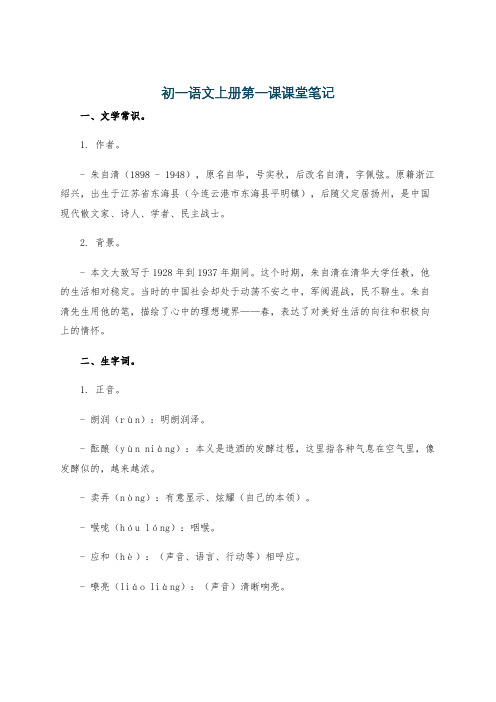
初一语文上册第一课课堂笔记一、文学常识。
1. 作者。
- 朱自清(1898 - 1948),原名自华,号实秋,后改名自清,字佩弦。
原籍浙江绍兴,出生于江苏省东海县(今连云港市东海县平明镇),后随父定居扬州,是中国现代散文家、诗人、学者、民主战士。
2. 背景。
- 本文大致写于1928年到1937年期间。
这个时期,朱自清在清华大学任教,他的生活相对稳定。
当时的中国社会却处于动荡不安之中,军阀混战,民不聊生。
朱自清先生用他的笔,描绘了心中的理想境界——春,表达了对美好生活的向往和积极向上的情怀。
二、生字词。
1. 正音。
- 朗润(rùn):明朗润泽。
- 酝酿(yùn niàng):本义是造酒的发酵过程,这里指各种气息在空气里,像发酵似的,越来越浓。
- 卖弄(nòng):有意显示、炫耀(自己的本领)。
- 喉咙(hóu lóng):咽喉。
- 应和(hè):(声音、语言、行动等)相呼应。
- 嘹亮(liáo liàng):(声音)清晰响亮。
- 烘托(hōng tuō):本是一种绘画的技法,用水墨或色彩在物象的轮廓外面渲染衬托,使物象明显突出。
这里指写作时先从侧面描写,然后再引出主题,使要表现的事物鲜明突出。
- 静默(jìng mò):寂静;没有声音。
- 风筝(zhēng):一种玩具,在竹篾等做的骨架上糊纸或绢,拉着系在上面的长线,趁着风势可以放上天空。
- 抖擞(dǒu sǒu):振作;奋发。
- 健壮(jiàn zhuàng):健康强壮。
2. 多音字。
- 涨:- 涨(zhǎng)水:水位升高。
- 涨(zhàng)红:充血。
- 薄:- 薄(báo)烟:厚度小的。
- 薄(bó)雾:轻微、少。
- 薄(bò)荷:一种植物。
三、文章结构。
1. 盼春(1 - 2段)- 第一段:开篇点题,总领全文,写“盼望着,盼望着,东风来了,春天的脚步近了”,运用了反复和拟人的修辞,强调了作者盼望春天到来的急切心情,“东风”点明了春天的到来,“春天的脚步近了”将春天当作人来写,形象生动。
四上语文第一课观潮笔记
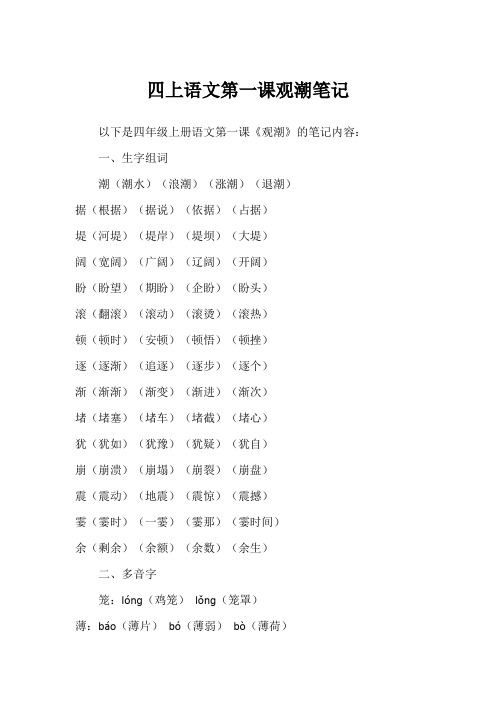
四上语文第一课观潮笔记以下是四年级上册语文第一课《观潮》的笔记内容:一、生字组词潮(潮水)(浪潮)(涨潮)(退潮)据(根据)(据说)(依据)(占据)堤(河堤)(堤岸)(堤坝)(大堤)阔(宽阔)(广阔)(辽阔)(开阔)盼(盼望)(期盼)(企盼)(盼头)滚(翻滚)(滚动)(滚烫)(滚热)顿(顿时)(安顿)(顿悟)(顿挫)逐(逐渐)(追逐)(逐步)(逐个)渐(渐渐)(渐变)(渐进)(渐次)堵(堵塞)(堵车)(堵截)(堵心)犹(犹如)(犹豫)(犹疑)(犹自)崩(崩溃)(崩塌)(崩裂)(崩盘)震(震动)(地震)(震惊)(震撼)霎(霎时)(一霎)(霎那)(霎时间)余(剩余)(余额)(余数)(余生)二、多音字笼:lónɡ(鸡笼)lǒnɡ(笼罩)薄:báo(薄片)bó(薄弱)bò(薄荷)三、近义词顿时——立刻奔腾——奔驰依旧——依然屹立——矗立犹如——如同宽阔——宽广四、反义词宽阔——狭窄平静——喧闹人声鼎沸——鸦雀无声五、理解词语天下奇观:世界上奇异的景象。
这里指钱塘江大潮是世界上少见的壮观景象。
横卧:横躺着。
文中指钱塘江横卧在眼前。
水天相接:水和天连接在一起。
形容水域广阔。
横贯:横着通过去。
文中指大潮滚滚而来,横着漫过整个江面。
浩浩荡荡:形容水势浩大,气势雄伟。
山崩地裂:山岳倒塌,地面裂缝。
文中形容浪潮声音巨大。
风号浪吼:狂风号叫,波浪怒吼。
形容风浪大,声音响。
六、课文结构第一段(第1 自然段):总写钱塘江大潮被称为天下奇观。
第二段(第2 自然段):写潮来前的景象。
第三段(第3-4 自然段):写潮来时的壮观景象。
第四段(第5 自然段):写潮退去时的景象。
七、句子解析钱塘江大潮,自古以来被称为天下奇观。
这句话是全文的中心句,起到总领全文的作用。
浪潮越来越近,犹如千万匹白色战马齐头并进,浩浩荡荡地飞奔而来;那声音如同山崩地裂,好像大地都被震得颤动起来。
这句话用了比喻的修辞手法,把浪潮比作白色战马,形象地写出了钱塘江大潮到来时的奔腾之势。
七年级下册第一课课堂笔记

七年级下册第一课课堂笔记以下是七年级下册第一课《邓稼先》的课堂笔记,供您参考:一、生字注音1. 鞠躬尽瘁(jū gōng jìn cuì)2. 家喻户晓(jiā yù hù xiǎo)3. 妇孺皆知(fù rú jiē zhī)4. 寥寥无几(liáo liáo wú jǐ)5. 铤而走险(tǐng ér zǒu xiǎn)6. 鲜为人知(xiǎn wéi rén zhī)二、重点词语解释1. 家喻户晓:家家户户都知道,形容人所共知。
2. 鞠躬尽瘁:竭尽全力,至死方休。
3. 死而后已:死后才罢休,形容奋斗到底。
4. 鲜为人知:很少有人知道。
5. 当之无愧:当得起某种荣誉或称号,没有愧疚。
6. 截然不同:形容两个事物毫无共同之处。
7. 锋芒毕露:比喻锐气和才干全都显露出来。
8. 任人宰割:比喻任凭别人欺压、剥削。
三、课文内容理解1. 本文主要讲述了邓稼先的生平和贡献,重点突出了他的卓越才能和崇高品质。
2. 邓稼先在研制原子弹和氢弹的过程中,发挥了至关重要的作用,是中国核武器事业的奠基人和开拓者。
3. 邓稼先的人生经历充满了坎坷和挫折,但他始终坚定信念,勇往直前,为国家和民族的利益奋斗终身。
4. 本文通过邓稼先的事迹,赞扬了他的爱国精神、奉献精神和创新精神,表达了对他的崇敬和怀念之情。
四、问题思考1. 邓稼先为什么能够成为中国核武器事业的奠基人和开拓者?他具备哪些优秀的品质?答:邓稼先之所以能够成为中国核武器事业的奠基人和开拓者,是因为他具备坚定的信念、卓越的才能和崇高品质。
他勇往直前、不畏艰险,始终为国家和民族的利益奋斗终身。
同时,他也具有极高的创新意识和实践能力,能够在科研领域不断探索和突破。
这些优秀的品质使得邓稼先在中国核武器事业中发挥了至关重要的作用。
2. 本文通过哪些事迹来表现邓稼先的优秀品质?请简要概括。
语文六上第一课课堂笔记

语文六上第一课课堂笔记以下是六年级上册第1课《草原》的课堂笔记:1.本文是作者第一次访问内蒙古大草原时看到的美丽景色及受到蒙古族同胞的热情欢迎的情景。
2.本文是按事情的发展顺序叙述的。
3.本文主要写了一群马,因此,作者重点抓住马群的颜色和迎客、表演、送客时的队形来写。
4.本文在描写景物时,不仅从近到远进行描写,而且把动景与静景对比着写。
如静寂的草原是动景,车前马后是动景,洁白的羊群是动景;而蒙古包是静景,小丘是静景。
这样写不仅写出景物的动态美,也写出静态美,使读者身临其境。
5.本文在描写景物时,不仅从视觉方面写,还从听觉方面写。
如写“群马疾驰”“襟飘带舞”是视觉方面写的,而“汽笛长鸣”“车铃叮当”则是听觉方面写的。
6.本文在描写景物时,运用了比喻和拟人的修辞手法。
如把马比作彩虹,把羊群比作绿毯;又把马叫,把羊唤,把牛吼拟人化。
7.本文以“蒙汉情深何忍别,天涯碧草话斜阳”这句话作为结尾,抒发了作者对草原美景及蒙古族人民的热爱之情。
8.本文的写作目的是赞美草原的景色和蒙古族人民的热情好客。
9.“这次,我看到了草原。
”这句话既点明了文章的中心,又点明了作者这次草原之行的感受。
10.“在这境界里,连骏马和大牛都有时候静立不动,好像回味着草原的无限乐趣。
”这句话采用了拟人的修辞手法,生动形象地描绘出草原的自然风光之美。
11.“飞”字表现了作者喜悦轻快的心情,“洒”字则表现了作者的豪迈之情。
12.“握手再握手,笑了再笑。
”这句话中的两个“再”字表现了蒙古族人民和汉族人民的深厚情谊和依依惜别之情。
13.“风,呼呼地刮着;雨,哗哗地下着。
”这句话运用了对偶的修辞手法,表现了气候的变化无常。
14.“羊群一会儿上了小丘,一会儿又下来,走在哪里都像给无边的绿毯绣上了白色的大花。
”这句话运用了比喻的修辞手法,生动形象地描绘出草原的美丽景色。
15.“那些小丘的线条是那么柔美,就像只用绿色渲染,不用墨线勾勒的中国画那样,到处翠色欲流,轻轻流入云际。
六年级语文上册第一课课堂笔记

六年级语文上册第一课课堂笔记
以下是人教版六年级语文上册第一课《草原》的部分课堂笔记:
一、作者简介
老舍(1899 年2 月3 日—1966 年8 月24 日),原名舒庆春,字舍予,另有笔名絜青、鸿来、非我等。
因为老舍生于立春,父母为他取名“庆春”,大概含有庆贺春来、前景美好之意。
上学后,自己更名为舒舍予,含有“舍弃自我”,亦即“忘我”的意思。
北京满族正红旗人。
中国现代小说家、作家、语言大师、人民艺术家、北京人艺编剧,新中国第一位获得“人民艺术家”称号的作家。
代表作有小说《骆驼祥子》《四世同堂》,话剧《茶馆》《龙须沟》。
二、主题思想
本文是作者第一次访问内蒙古大草原时的所见、所闻、所感,并通过这些所见、所闻、所感,赞美了草原的美丽风光和民族之间的团结。
三、文章结构
全文共有5 个自然段,可以分为两部分。
第一部分(第1 自然段):描绘了草原秀美的景色。
第二部分(第2-5 自然段):描绘了草原迎客场面和草原联欢的情形。
四、词语解析
1. 一碧千里:一眼望去全部都是绿色,形容很大的范围内都是碧绿的颜色。
2. 翠色欲流:翠绿的颜色好像就要流淌出来一样,形容绿到了极致。
3. 襟飘带舞:衣襟和裙带随风舞动。
4. 鄂温克:我国少数民族之一,主要分布在黑龙江省讷河县和内蒙古自治区。
5. 陈巴尔虎旗:在内蒙古自治区呼伦贝尔盟西部,海拉尔河下游。
高一历史第一课课堂笔记
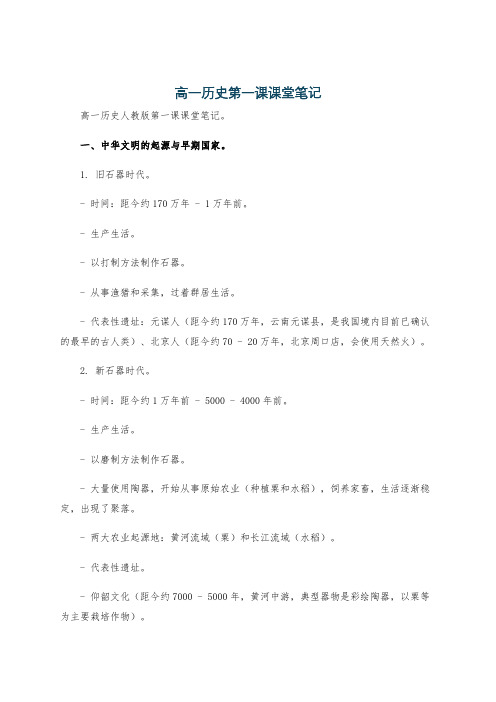
高一历史第一课课堂笔记高一历史人教版第一课课堂笔记。
一、中华文明的起源与早期国家。
1. 旧石器时代。
- 时间:距今约170万年 - 1万年前。
- 生产生活。
- 以打制方法制作石器。
- 从事渔猎和采集,过着群居生活。
- 代表性遗址:元谋人(距今约170万年,云南元谋县,是我国境内目前已确认的最早的古人类)、北京人(距今约70 - 20万年,北京周口店,会使用天然火)。
2. 新石器时代。
- 时间:距今约1万年前 - 5000 - 4000年前。
- 生产生活。
- 以磨制方法制作石器。
- 大量使用陶器,开始从事原始农业(种植粟和水稻),饲养家畜,生活逐渐稳定,出现了聚落。
- 两大农业起源地:黄河流域(粟)和长江流域(水稻)。
- 代表性遗址。
- 仰韶文化(距今约7000 - 5000年,黄河中游,典型器物是彩绘陶器,以粟等为主要栽培作物)。
- 大汶口文化(距今约7000 - 5000年,黄河下游)。
- 河姆渡文化(距今约7000 - 5000年,长江下游,种植水稻,使用骨耜,住干栏式建筑)。
- 龙山文化(距今约5000年,黄河流域,代表器物是黑陶,被称为“蛋壳陶”,私有制已经产生,阶级分化日益明显)。
- 红山文化(距今约5000年,北方辽河上游,出土了精美的玉器,出现了较大规模的祭坛和神庙)。
- 良渚文化(距今约5000年,长江下游,有规模宏大的水利系统,阶级分化明显,有玉礼器)。
3. 从部落到国家。
- 三皇五帝传说。
- 三皇:传说中的远古帝王,说法不一,如伏羲、女娲、神农等。
- 五帝:黄帝、颛顼、帝喾、尧、舜。
他们被视为华夏始祖,通过禅让制传承部落联盟首领的位置。
- 夏朝(约公元前2070 - 约公元前1600年)- 建立:禹建立夏朝,他治水成功,提高了威望,后传位于启,标志着世袭制代替禅让制,“家天下”开始。
- 国家治理。
- 中央:设有主管行政、军事、司法和宗教的机构与职官。
- 地方:直接统治夏部族生活的地区,对其他地方主要通过控制一些部族进行间接统治。
六年级上册第一课课堂笔记

六年级上册第一课课堂笔记
以下是一份六年级上册第一课《稻草人》的课堂笔记,供您参考:
1. 课文介绍:《稻草人》是中国现代著名作家叶圣陶所写的一篇童话。
这篇文章主要讲述了一个稻草人经历的事情,揭示了社会的一些现实问题。
2. 生字词:
稻草人
祸事
哭诉
一步
波纹
拍打
咬嚼
安排
昏沉
剩残
3. 主要内容:这篇文章主要讲述了一个稻草人在农田里经历的事情。
一开始,稻草人看到田里的稻子长势良好,为主人感到开心。
但后来,稻草人看到许多虫子在吃稻子,它想赶走虫子但动不了,非常痛苦。
最后,稻草人看到主人要收割稻子,但发现稻子几乎都被虫子吃光了,它为主人感到难过。
4. 主题思想:这篇文章通过稻草人的所见所感,揭示了当时社会的现实问题,如农村的贫困、农民的苦难等。
同时,也表达了对劳动人民的同情和对社会现实的反思。
5. 写作特点:叶圣陶在《稻草人》中运用了生动的描写和丰富的细节,使读者对稻草人的感受更加真实。
此外,文章中还有一些象征和隐喻的手法,如稻草人象征着现实生活中那些无力改变现状的人。
6. 思考题:
为什么稻草人会感到痛苦?
稻草人象征了什么?
你认为这篇文章的主题是什么?
7. 课后作业:请写一篇短文,描述你心中的理想世界,并说明为什么你认为这个世界是理想的。
八上语文第一课课堂笔记

八上语文第一课课堂笔记八年级上册语文第一课课堂笔记第一课《父亲的臂弯》本节课主要通过课文《父亲的臂弯》的学习,让学生了解到父亲与子女之间的深情厚谊,并引导学生对亲情的感悟和思考。
下面是本节课的详细内容:一、导入1. 老师展示课题:“父亲的臂弯”,引导学生展开思考,提出问题:“你们对这个词有什么了解?”2. 师生互动:学生回答问题,老师引导学生提出“臂弯”一词的具体含义。
3. 老师启发思考:结合学生的回答,引出“父亲的臂弯”是如何恰当地描写父爱的。
二、课文学习1. 正式开始学习《父亲的臂弯》一课,让学生阅读课文,感受课文的意境,并了解课文的整体内容。
2. 学生自主朗读课文,然后分组讨论课文中出现的关键词语,如“臂弯”、“担子”、“马路”的意思和与故事之间的联系。
3. 老师带领学生分析课文结构:首先是以写人的形式引出人物,然后叙述两个父亲为了生活而付出的努力及他们之间的情感纽带。
4. 学生自主讨论,通过师生互动的方式,整理出课文中描写父爱的细节,如“下班回到家,总是先关心孩子的饮食起居”、“走路时,总会把我抱在臂弯里”。
5. 老师引导学生分析课文使用的修辞手法,如比喻、排比等,以加深学生对课文的理解和欣赏。
三、情感体验1. 老师让学生将自己的亲身经历与课文中的父爱情节进行比较,并通过小组讨论的方式,展示自己的体验和感受。
2. 学生在小组中分享自己与父亲相处的美好瞬间,学会感恩父爱,珍惜与父亲的时光。
四、展示交流1. 学生代表将自己的体验和感受展示给全班同学,通过口述和朗读的方式,与同学分享父爱的力量和温暖。
2. 老师在学生分享之后进行点评和总结,鼓励学生表达自己对课文的理解和思考。
五、延伸拓展1. 老师带领学生欣赏其他描写父爱的经典诗歌、文章,并引导学生对比、分析,加深对父爱的理解和认识。
2. 学生们通过音乐、绘画、手工等形式,表达对父爱的感激和祝福。
六、小结1. 老师进行本节课的总结,回顾学习内容,检查学生的掌握情况。
六上语文第1课笔记

六上语文第1课笔记最近啊,我重新翻开了六年级上册语文课本的第一课,这一翻,就像打开了一道回忆的大门,那些关于这第一课的点点滴滴一下子都涌了出来。
第一课是啥呢?是老舍先生的。
这篇文章啊,一读起来就仿佛能让人身临其境,感受到草原的辽阔和美丽。
当时老师在讲台上讲得眉飞色舞,我在下面也是听得津津有味。
还记得那堂课刚开始,老师走进教室,啥也没说,先在黑板上写下了“草原”两个大字。
那字写得龙飞凤舞的,特别有气势。
然后老师就问我们:“同学们,你们想象中的草原是什么样子的呀?”这一下可炸开了锅,大家七嘴八舌地说开了。
有的说草原是一片绿色的海洋,有的说草原上有成群的牛羊,还有的说草原的天空特别蓝。
老师笑着听我们说完,然后说:“那咱们今天就跟着老舍先生一起去真正的草原看看!”老师开始读课文了,她的声音特别好听,读着读着,我眼前好像真的出现了那片一望无际的草原。
“这次,我看到了草原。
那里的天比别处的更可爱,空气是那么清鲜,天空是那么明朗,使我总想高歌一曲,表示我满心的愉快。
”老师读到这儿的时候,特意强调了“清鲜”和“明朗”这两个词,说:“同学们,你们感受一下这两个词,是不是一下就把草原天空的特点给写出来啦?”我当时就在想,老舍先生可真厉害,几个词就让人好像能闻到草原上那新鲜的空气,看到那湛蓝湛蓝的天空。
“在天底下,一碧千里,而并不茫茫。
四面都有小丘,平地是绿的,小丘也是绿的。
羊群一会儿上了小丘,一会儿又下来,走在哪里都像给无边的绿毯绣上了白色的大花。
”这一段描写啊,简直绝了!老师让我们闭上眼睛想象那个画面,我就使劲想啊,想着那绿色的平地和小丘,还有那像大花一样的羊群。
睁开眼的时候,我感觉自己好像真的去草原走了一遭。
老师还跟我们讲了好多关于这篇文章的写作手法。
比如说比喻,把羊群比作白色的大花,把草原比作绿毯,多形象啊!还有拟人,“在这境界里,连骏马和大牛都有时候静立不动,好像回味着草原的无限乐趣。
”骏马和大牛居然会回味乐趣,太有意思啦!最让我印象深刻的是,老师让我们仿照课文里的描写也来写一写自己心中的美景。
高一化学第一课笔记

高一化学第一课笔记上高一啦!怀着既兴奋又紧张的心情,迎来了化学第一课。
这第一课呀,就像打开了一个神秘的魔法盒子,让我一下子掉进了化学的奇妙世界里。
一进教室,就看到讲台上摆着各种瓶瓶罐罐,还有一些奇奇怪怪的仪器。
化学老师呢,是个看起来很有经验的中年大叔,戴着副眼镜,眼神里透着股对化学的热爱和执着。
老师一开始并没有急着讲那些复杂的化学概念,而是先给我们讲了个小故事。
说是有个古代的国王,想要一种能把普通金属变成黄金的魔法药水,于是就召集了好多炼金术士来研究。
虽然最后没成功,但这也算是人类对化学最初的探索啦。
听到这,我心里就想,这化学还挺有意思的,连国王都这么着迷。
接下来,老师正式开讲啦。
他拿起一支粉笔,在黑板上写下了大大的“化学”两个字。
然后说:“同学们,化学啊,其实就是研究物质的组成、结构、性质以及变化规律的一门科学。
”这听起来好像有点抽象,不过别急,老师马上就开始举例啦。
他拿起一个装满水的透明杯子,问我们:“这水看起来很简单吧?但你们知道吗,水是由氢和氧两种元素组成的。
”说着,他就在黑板上写下了水的化学式 H₂O。
“这小小的 H₂O 里,可藏着大秘密呢!氢原子和氧原子通过一定的方式结合在一起,才形成了我们每天都离不开的水。
”然后,老师又拿起一瓶无色的液体,告诉我们这是盐酸。
他把盐酸滴在一块大理石上,瞬间就冒出了好多气泡。
“看,这就是化学反应!盐酸和大理石中的碳酸钙发生了反应,产生了二氧化碳气体。
”那一个个小气泡咕噜咕噜往上冒的样子,真的太神奇了。
讲到原子和分子的时候,老师拿出了一个大大的模型。
那是一个由小球和小棍组成的结构,代表着一个分子。
他一边摆弄着模型,一边给我们解释:“原子就像是这个小球,分子呢,就是由几个小球通过小棍连接在一起形成的。
不同的原子组合成不同的分子,就有了各种各样的物质。
”最让我印象深刻的,是老师做的那个金属钠和水反应的实验。
只见他从一个小瓶子里取出一小块金属钠,用镊子把它放到一个装满水的水槽里。
四年级第一课课堂笔记

四年级第一课课堂笔记一、生字词。
1. 会认的字。
- 盐(yán):食盐,盐巴。
- 屹(yì):屹立,形容山或建筑物高耸而稳固地立着。
- 昂(áng):昂首,仰着头。
- 顿(dùn):顿时,立刻。
- 鼎(dǐng):人声鼎沸,形容人群的声音吵吵嚷嚷,就像煮开了锅一样。
鼎是古代煮东西用的器物,圆形,三足两耳。
- 沸(fèi):沸腾,液体达到一定温度时急剧转化为气体,产生大量气泡。
- 贯(guàn):横贯,横着通过去。
- 浩(hào):浩浩荡荡,原形容水势广大的样子。
后形容事物的广阔壮大,或前进的人流声势浩大。
- 崩(bēng):山崩地裂,山岳倒塌,大地裂开。
形容响声巨大或变化剧烈。
- 震(zhèn):震动,颤动。
- 霎(shà):霎时,极短的时间。
2. 会写的字。
- 潮:左右结构,左边是“氵”,右边是“朝”。
潮水,潮汐。
- 据:左右结构,左边是“扌”,右边是“居”。
据说,根据。
- 堤:左右结构,左边是“土”,右边是“是”。
大堤,堤坝。
- 阔:半包围结构,门字框,里面是“活”。
宽阔,广阔。
- 笼:上下结构,上面是“⺮”,下面是“龙”。
笼罩,笼子。
- 罩:上下结构,上面是“罒”,下面是“卓”。
口罩,灯罩。
- 盼:左右结构,左边是“目”,右边是“分”。
盼望,期盼。
- 滚:左右结构,左边是“氵”,右边是“衮”。
滚动,滚蛋。
- 顿:左右结构,左边是“屯”,右边是“页”。
停顿,顿号。
- 逐:半包围结构,里面是“豕”,外面是“辶”。
追逐,逐渐。
- 渐:左右结构,左边是“氵”,右边是“斩”。
渐渐,渐变。
- 犹:左右结构,左边是“犭”,右边是“尤”。
犹如,犹豫。
- 崩:上下结构,上面是“山”,下面是“朋”。
崩塌,崩溃。
- 震:上下结构,上面是“雨”,下面是“辰”。
地震,震动。
- 余:上下结构,上面是“人”,下面是“示”。
剩余,余数。
七年级第一课课堂笔记
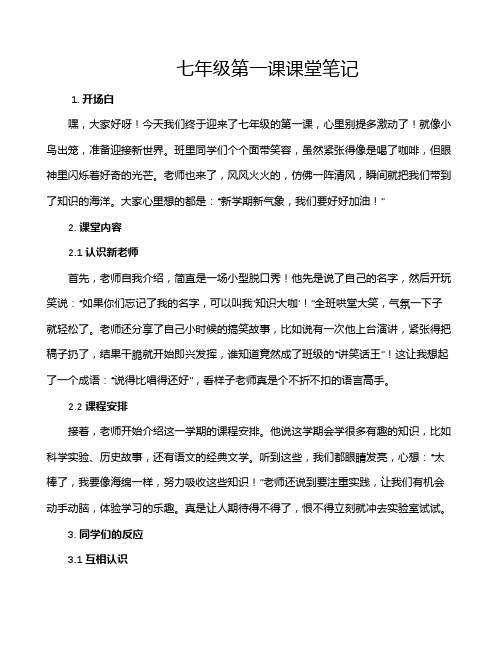
七年级第一课课堂笔记1. 开场白嘿,大家好呀!今天我们终于迎来了七年级的第一课,心里别提多激动了!就像小鸟出笼,准备迎接新世界。
班里同学们个个面带笑容,虽然紧张得像是喝了咖啡,但眼神里闪烁着好奇的光芒。
老师也来了,风风火火的,仿佛一阵清风,瞬间就把我们带到了知识的海洋。
大家心里想的都是:“新学期新气象,我们要好好加油!”2. 课堂内容2.1 认识新老师首先,老师自我介绍,简直是一场小型脱口秀!他先是说了自己的名字,然后开玩笑说:“如果你们忘记了我的名字,可以叫我‘知识大咖’!”全班哄堂大笑,气氛一下子就轻松了。
老师还分享了自己小时候的搞笑故事,比如说有一次他上台演讲,紧张得把稿子扔了,结果干脆就开始即兴发挥,谁知道竟然成了班级的“讲笑话王”!这让我想起了一个成语:“说得比唱得还好”,看样子老师真是个不折不扣的语言高手。
2.2 课程安排接着,老师开始介绍这一学期的课程安排。
他说这学期会学很多有趣的知识,比如科学实验、历史故事,还有语文的经典文学。
听到这些,我们都眼睛发亮,心想:“太棒了,我要像海绵一样,努力吸收这些知识!”老师还说到要注重实践,让我们有机会动手动脑,体验学习的乐趣。
真是让人期待得不得了,恨不得立刻就冲去实验室试试。
3. 同学们的反应3.1 互相认识上课过程中,老师鼓励我们互相认识,大家就开始了“自我介绍大赛”。
有的同学大方得像只小狮子,有的则羞涩得像只小兔子。
一个同学站起来说:“我喜欢打篮球,希望能和大家一起组个球队!”另一个同学立刻回应:“那我们得找个队名,咱们叫‘篮球小霸王’怎么样?”笑声不断,感觉班级的凝聚力一下子就起来了。
真有“团结就是力量”的感觉!3.2 课外活动除了课堂,老师还提到了一些课外活动,比如社团和兴趣小组。
瞬间,教室里又炸开了锅!有的同学兴奋地说:“我想加入文学社,写小说!”有的则激动地叫:“我想去摄影社,拍美美的照片!”这时候,我想起了一个老话:“兴趣是最好的老师”,看来大家都有自己的梦想,真让人佩服。
第一课白鹭的课堂笔记
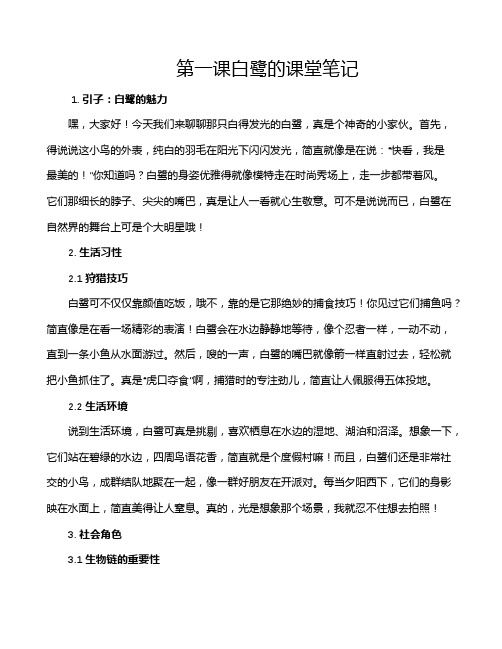
第一课白鹭的课堂笔记1. 引子:白鹭的魅力嘿,大家好!今天我们来聊聊那只白得发光的白鹭,真是个神奇的小家伙。
首先,得说说这小鸟的外表,纯白的羽毛在阳光下闪闪发光,简直就像是在说:“快看,我是最美的!”你知道吗?白鹭的身姿优雅得就像模特走在时尚秀场上,走一步都带着风。
它们那细长的脖子、尖尖的嘴巴,真是让人一看就心生敬意。
可不是说说而已,白鹭在自然界的舞台上可是个大明星哦!2. 生活习性2.1 狩猎技巧白鹭可不仅仅靠颜值吃饭,哦不,靠的是它那绝妙的捕食技巧!你见过它们捕鱼吗?简直像是在看一场精彩的表演!白鹭会在水边静静地等待,像个忍者一样,一动不动,直到一条小鱼从水面游过。
然后,嗖的一声,白鹭的嘴巴就像箭一样直射过去,轻松就把小鱼抓住了。
真是“虎口夺食”啊,捕猎时的专注劲儿,简直让人佩服得五体投地。
2.2 生活环境说到生活环境,白鹭可真是挑剔,喜欢栖息在水边的湿地、湖泊和沼泽。
想象一下,它们站在碧绿的水边,四周鸟语花香,简直就是个度假村嘛!而且,白鹭们还是非常社交的小鸟,成群结队地聚在一起,像一群好朋友在开派对。
每当夕阳西下,它们的身影映在水面上,简直美得让人窒息。
真的,光是想象那个场景,我就忍不住想去拍照!3. 社会角色3.1 生物链的重要性白鹭在生态系统中扮演着重要角色,简直就是自然界的“清道夫”。
它们通过捕食小鱼和昆虫,帮助维持水域的生态平衡。
这样一来,水里就不会因为小鱼太多而变得混乱。
它们的存在,让整个生态系统运转得更加顺畅,就像一个精密的钟表,各个部分都缺一不可,白鹭就是那个关键的齿轮,缺了它可不行啊!3.2 文化象征在一些地方,白鹭还是吉祥的象征,代表着纯洁和优雅。
人们常常把它们与幸福、美好挂钩,看到白鹭飞过,心里总会冒出“风水轮流转”的感觉。
它们的形象不仅出现在诗词歌赋里,还在各种艺术作品中频繁亮相。
可以说,白鹭已经成为了文化的一部分,带着人们对美好生活的向往。
4. 小结:我们的白鹭课堂总的来说,白鹭可真是个迷人的存在,从它们的外貌到习性,再到它们在生态系统中的角色,真是让人爱不释手。
六年级上册第1课课堂笔记

六年级上册第一课课堂笔记
今儿个上六年级上册的第一堂课,老师一进门就笑眯眯地说:“同学们,咱们今天要开始新学期的学习咯,打起精神来哈!”
讲台上,老师翻开书,指着第一课说:“这篇课文讲的是《长城》,晓得伐?长城啊,那可是咱老祖宗留下来的宝贝,长得很,从山海关一直到嘉峪关,远远儿望去,像一条巨龙盘在山上头。
”
我听老师这么一讲,心里头那个激动哦,仿佛自己都已经站到了长城上,风吹起衣裳角角,凉快得很。
老师又说:“长城不光是长,它还特别坚固,几千年风吹雨打都没垮,多亏了古时候那些工匠,手艺真是没得说。
”
同学们一个个听得入迷,有人还举手问:“老师,长城上头真的能骑马不?”老师笑着说:“当然可以,古代打仗的时候,士兵们就在长城上头骑马巡逻,保护我们的家园。
”
我暗暗记在心里,长城不光是道墙,它还承载着咱中华儿女的勇气和智慧。
老师说,咱们今天也要学习这种精神,不怕困难,努力学习,将来为国家做贡献。
这堂课过得真快,下课铃声一响,同学们还在讨论长城的事儿。
我想,以后有机会,一定要亲自去看看长城,感受一下它的雄伟和壮观。
这堂课让我明白了,学习知识不光是书本上的事儿,还要用心去感受,去体会,这样才能真正学到东西。
6年级语文第一课课堂笔记
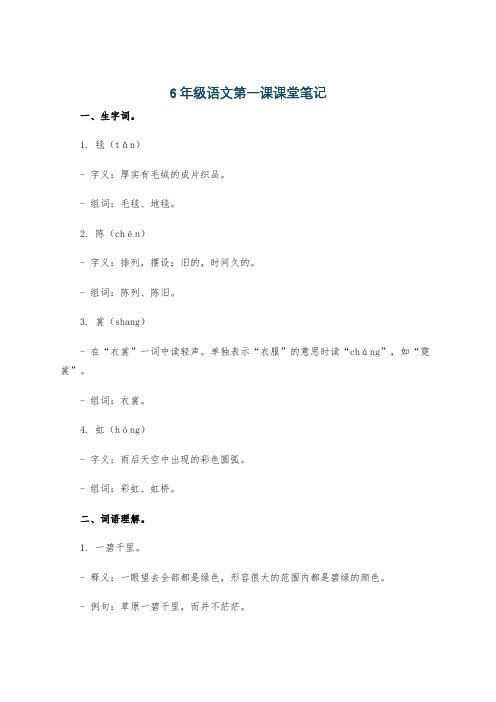
6年级语文第一课课堂笔记一、生字词。
1. 毯(tǎn)- 字义:厚实有毛绒的成片织品。
- 组词:毛毯、地毯。
2. 陈(chén)- 字义:排列,摆设;旧的,时间久的。
- 组词:陈列、陈旧。
3. 裳(shang)- 在“衣裳”一词中读轻声。
单独表示“衣服”的意思时读“cháng”,如“霓裳”。
- 组词:衣裳。
4. 虹(hóng)- 字义:雨后天空中出现的彩色圆弧。
- 组词:彩虹、虹桥。
二、词语理解。
1. 一碧千里。
- 释义:一眼望去全部都是绿色,形容很大的范围内都是碧绿的颜色。
- 例句:草原一碧千里,而并不茫茫。
2. 翠色欲流。
- 释义:翠绿的颜色好像就要流淌出来一样,形容绿到了极致。
- 例句:那些小丘的线条是那么柔美,就像只用绿色渲染,不用墨线勾勒的中国画那样,到处翠色欲流。
三、段落分析。
1. 第一段(第1自然段):草原美景。
- 作者初入草原看到的景色。
“在天底下,一碧千里,而并不茫茫。
”写出了草原的辽阔和碧绿。
“四面都有小丘,平地是绿的,小丘也是绿的。
”进一步强调草原到处都是绿色。
“羊群一会儿上了小丘,一会儿又下来,走在哪里都像给无边的绿毯绣上了白色的大花。
”运用比喻的修辞手法,把草原比作绿毯,把羊群比作白色的大花,生动形象地写出了草原的动态美。
2. 第二段(第2自然段):欢迎远客。
- “汽车走了一百五十里,才到达目的地。
一百五十里全是草原。
再走一百五十里,也还是草原。
”通过强调距离,突出草原的辽阔。
“见到我们,主人们立刻拨转马头,欢呼着,飞驰着,在汽车左右与前面引路。
”写出了蒙古族同胞的热情好客。
3. 第三段(第3自然段):热情款待。
- 描写了蒙古族同胞的热情款待。
“也不知怎的,就进了蒙古包。
奶茶倒上了,奶豆腐摆上了,主客都盘腿坐下,谁都有礼貌,谁都又那么亲热,一点不拘束。
”通过描写蒙古族同胞的招待,表现出蒙汉两族人民之间的亲密无间。
4. 第四段(第4自然段):联欢话别。
历史第一课课堂笔记
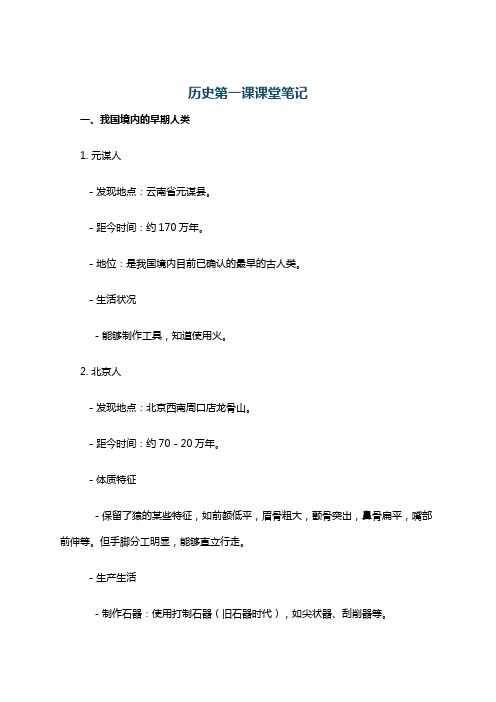
历史第一课课堂笔记
一、我国境内的早期人类
1. 元谋人
- 发现地点:云南省元谋县。
- 距今时间:约170万年。
- 地位:是我国境内目前已确认的最早的古人类。
- 生活状况
- 能够制作工具,知道使用火。
2. 北京人
- 发现地点:北京西南周口店龙骨山。
- 距今时间:约70 - 20万年。
- 体质特征
- 保留了猿的某些特征,如前额低平,眉骨粗大,颧骨突出,鼻骨扁平,嘴部前伸等。
但手脚分工明显,能够直立行走。
- 生产生活
- 制作石器:使用打制石器(旧石器时代),如尖状器、刮削器等。
- 群居生活:共同劳动,共同分享劳动果实,形成早期的原始社会。
- 学会用火:会使用天然火,还会保存火种。
用火烧烤食物、防寒、照明、驱兽,改善了生存条件。
3. 山顶洞人
- 发现地点:北京周口店龙骨山顶部的洞穴里。
- 距今时间:约3万年。
- 体质特征:模样和现代人基本相同。
- 生产生活
- 掌握磨光和钻孔技术,骨针是他们最典型的缝纫工具,说明他们已经会缝制衣服。
- 人工取火:比北京人进步,增强了人类适应自然的能力。
- 具有审美观念:他们会用骨针、贝壳、石珠等制作装饰品。
二、研究人类起源的主要依据 - 化石
1. 定义:化石是研究远古人类历史的重要证据,它是古代生物的遗体、遗物或遗迹埋藏在地下变成的跟石头一样的东西。
2. 意义:通过对化石的研究,可以了解早期人类的体质特征、生产生活情况等。
例如,根据北京人的化石可以推测出他们的外貌、脑容量以及他们的生活方式等信息。
人教版六年级上册第一课课堂笔记
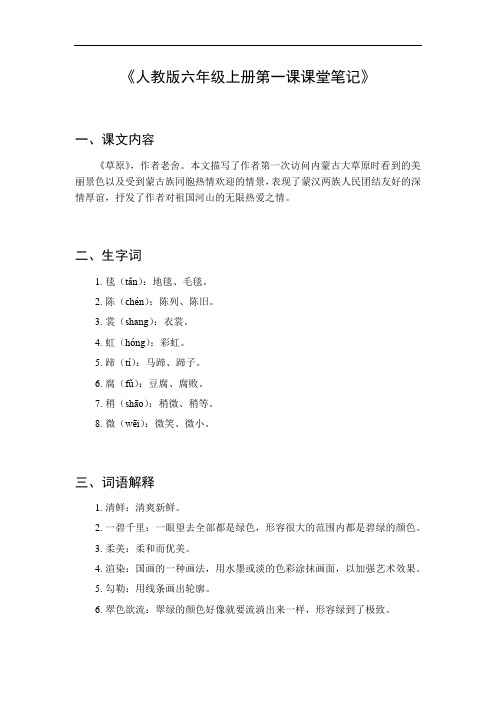
《人教版六年级上册第一课课堂笔记》一、课文内容《草原》,作者老舍。
本文描写了作者第一次访问内蒙古大草原时看到的美丽景色以及受到蒙古族同胞热情欢迎的情景,表现了蒙汉两族人民团结友好的深情厚谊,抒发了作者对祖国河山的无限热爱之情。
二、生字词1.毯(tǎn):地毯、毛毯。
2.陈(chén):陈列、陈旧。
3.裳(shang):衣裳。
4.虹(hóng):彩虹。
5.蹄(tí):马蹄、蹄子。
6.腐(fǔ):豆腐、腐败。
7.稍(shāo):稍微、稍等。
8.微(wēi):微笑、微小。
三、词语解释1.清鲜:清爽新鲜。
2.一碧千里:一眼望去全部都是绿色,形容很大的范围内都是碧绿的颜色。
3.柔美:柔和而优美。
4.渲染:国画的一种画法,用水墨或淡的色彩涂抹画面,以加强艺术效果。
5.勾勒:用线条画出轮廓。
6.翠色欲流:翠绿的颜色好像就要流淌出来一样,形容绿到了极致。
四、重点句子分析1.“在天底下,一碧千里,而并不茫茫。
”这句话写出了草原的辽阔碧绿,同时又不显得空旷单调。
“一碧千里”表现了草原的广阔无垠,“并不茫茫”则说明草原上有各种景物点缀,富有生机。
2.“那些小丘的线条是那么柔美,就像只用绿色渲染,不用墨线勾勒的中国画那样,到处翠色欲流,轻轻流入云际。
”这句话运用比喻的修辞手法,把小丘比作只用绿色渲染,不用墨线勾勒的中国画,生动形象地写出了小丘线条的柔美和草原的翠色欲流,给人以美的享受。
3.“蒙汉情深何忍别,天涯碧草话斜阳。
”这句话是全文的中心句,也是点睛之笔。
它表达了蒙汉两族人民之间深厚的情谊,不忍分别,在夕阳下,在无边的草原上,互相倾诉着惜别之情。
五、课文结构1.第一部分(第1 自然段):描绘了草原的美丽景色,给人留下深刻的印象。
2.第二部分(第2-3 自然段):描写了草原人民迎接远方客人的情景,表现了蒙古族人民的热情好客。
3.第三部分(第4-5 自然段):叙述了主客联欢的场面,体现了蒙汉两族人民的深情厚谊。
九年级语文第一课笔记
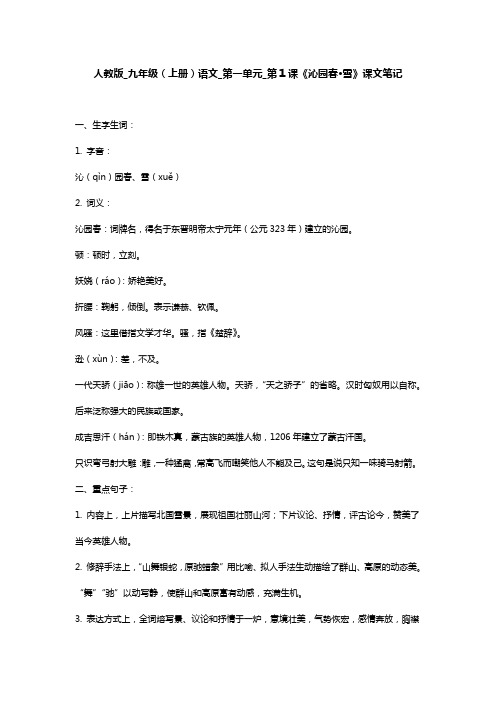
人教版_九年级(上册)语文_第一单元_第1课《沁园春·雪》课文笔记一、生字生词:1. 字音:沁(qìn)园春、雪(xuě)2. 词义:沁园春:词牌名,得名于东晋明帝太宁元年(公元323年)建立的沁园。
顿:顿时,立刻。
妖娆(ráo):娇艳美好。
折腰:鞠躬,倾倒。
表示谦恭、钦佩。
风骚:这里借指文学才华。
骚,指《楚辞》。
逊(xùn):差,不及。
一代天骄(jiāo):称雄一世的英雄人物。
天骄,“天之骄子”的省略。
汉时匈奴用以自称。
后来泛称强大的民族或国家。
成吉思汗(hán):即铁木真,蒙古族的英雄人物,1206年建立了蒙古汗国。
只识弯弓射大雕:雕,一种猛禽,常高飞而嘲笑他人不能及己。
这句是说只知一味骑马射箭。
二、重点句子:1. 内容上,上片描写北国雪景,展现祖国壮丽山河;下片议论、抒情,评古论今,赞美了当今英雄人物。
2. 修辞手法上,“山舞银蛇,原驰蜡象”用比喻、拟人手法生动描绘了群山、高原的动态美。
“舞”“驰”以动写静,使群山和高原富有动感,充满生机。
3. 表达方式上,全词熔写景、议论和抒情于一炉,意境壮美,气势恢宏,感情奔放,胸襟豪迈,颇能代表毛泽东诗词的豪放风格。
4. 结构上,“俱往矣”承上,“数风流人物”启下,充分肯定历代英雄人物的历史功绩,表达了词人对古代英雄的仰慕之情。
“秦皇汉武”“唐宗宋祖”“成吉思汗”是本词提到的五位封建帝王,“秦皇汉武”属于偏正结构短语,“汉武帝”属于专有名词。
“唐宗宋祖”“成吉思汗”均属于专有名词。
- 1、下载文档前请自行甄别文档内容的完整性,平台不提供额外的编辑、内容补充、找答案等附加服务。
- 2、"仅部分预览"的文档,不可在线预览部分如存在完整性等问题,可反馈申请退款(可完整预览的文档不适用该条件!)。
- 3、如文档侵犯您的权益,请联系客服反馈,我们会尽快为您处理(人工客服工作时间:9:00-18:30)。
Provisional syllabus1.defining pragmatics(semantics vs. pragmatics)2.deixis3.prepositional meaning vs. implicature4.speech acts vs. illocutionary force5.presupposition6.conversational structure参考书目:Pragmatics: An introduction(何兆雄,姜望琪,何自然)Assignment: some 2500 words on pragmatic topicsImportant distinctions1.utterance vs. sentenceAn utterance from a particular word, phrase, or sentence because ana particular Speaker, Hearer, time, place, available things, and recent language, in addition to its own linguistic form. I'll sometimes refer to the Speaker and Hearer as utterance participants. For example, we can put the English words I, like, and it together to make the English sentence I like it, but this sentence is a different utterance each time it is uttered.Each utterance has its own context, and, as we will see below, for each context the sentence has a different meaning. That is, meaning always changes from one utterance context to another.(for the same sentence)The figure below is one way of representing the elements of an utterance context.different situation. For example, the Speaker role is filled by a particular person, and the Location role is filled by a particular place. We will meet the concept of role again later in this book; in fact it is one of the most fundamental notions in cognitive science.Distinction between usage and useThe term usage refers to conventions, most often to those of language. Thus, "English usage" or"French usage" refers to the conventions of those languages, respectively. When we refer to "word usage," we mean the conventions for using words; when we refer to "use of words," we mean only the employment of words: "This text describes the principles of word usage." "He is noted for his frequent use of wrong words."Usage: the way that words are used in a language:the way in which something id used, or the amount of it that is used 词语的使用,东西抽象、归纳的使用:car usage has increased dramatically.(使用方法,用量) a book on modern English usage关于现代英语用法的书Use:1 when people use something to do something: Are you in favor of the use of animals for research?2. A purpose for which something can be used the drug has many uses.3.If you have the use of something, you are able to use it or someone has allowed you to use it运用能力;使用权:Joe's given me the use of his office.Robin LakoffFrom Wikipedia, the free encyclopediaRobin Tolmach Lakoff (born 1942) is a professor of linguistics at the University of California, Berkeley. Lakoff's writings have become the basis for much research on the subject of women's language. In a 1975 article, she published ten basic assumptions about what she felt constituted a special women's language. Much of what Lakoff proposed agreed with theories originally proposed in the 1920s by Otto Jespersen in Growth and Structure of the English Language (1905, revised and republished several times).Lakoff's most famous work, Language and Woman's Place, introduced to the field of sociolinguistics many ideas about women's language that are now commonplace. She proposed (Language and Woman's Place) that women's speech can be distinguished from that of men in a number of ways, including:1.Hedges: Phrases like "sort of," "kind of," "it seems like"2.Empty adjectives: divine, adorable, gorgeous, etc3.(Super-)Polite forms: "Would you mind…" "Is it o.k if…?" "…if it’s not too much to ask"4.Apologize more: "I'm sorry, but I think that…"5.Speak less frequently6.Avoid coarse language or expletives7.Tag questions: "You don't mind eating this, do you?". Subsequent research has cast somedoubt on this proposition8.Hyper-correct grammar and pronunciation: Use of prestige grammar and clear articulation9.Indirect requests: "Wow I'm so thirsty." – really asking for a drink10.Speak in italics: Use tone to emphasis certain words, e.g., "so", "very", "quite".Lakoff also developed the 'Politeness Principle', in which she devised three maxims that are usually followed in interaction. These are: Don't impose, give the receiver options and make the receiver feel good. She stated that these are paramount in good interaction. By not adhering to these maxims, a speaker is said to be 'flouting the maxims'.。
